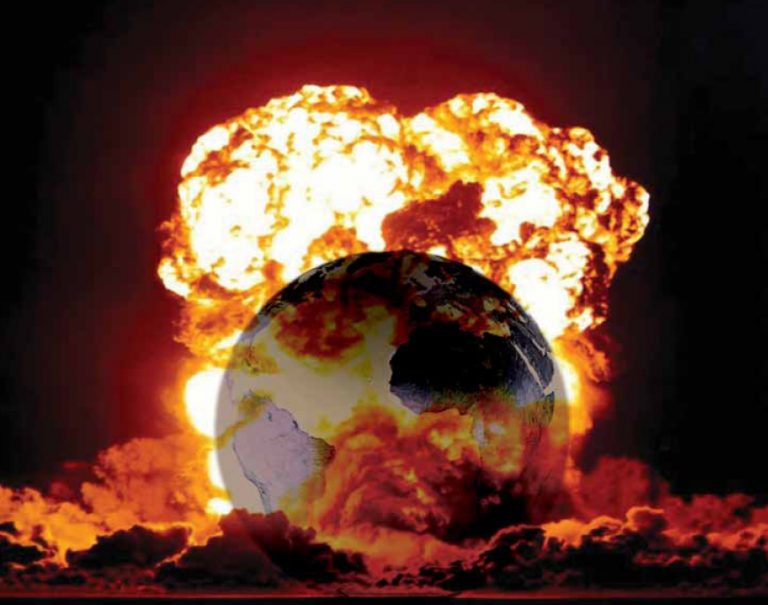"After the failed military adventures in the Middle East and Central Asia, nations must learn that there is no military solution. Instead of turning their troops around, the Western bloc and the Eastern bloc need to be at the negotiating table - once started, the arms race will be difficult to overcome."
Even though humans have spent centuries building this
world, they have developed technology that takes less than a moment to complete
this world. When this world will become smoke it needs only a miscalculation.
The world is on the brink of highly unpredictable war. All is set, only a push
is needed. Why it makes sense for another war?
Security dilemma:
Security dilemma may lead states to war owing to the perceived threat of state’s security. The Greek historian Thucydides used this perspective in the history of the Peloponnesian War. Distinguishing between the root causes of wars and the immediate causes, Thucydides came to know what made this war inevitable was the rise of extreme power. As Athens 'power grew, Sparta, Athens' biggest rival, became apprehensive of losing its power.
Thus, the changing distribution of power was the underlying cause of the Peloponnesian War. The changing power in world politics creates a security dilemma. China is growing rapidly, threatening US hegemony. Although the United States faced a formidable opponent during the Cold War, it succeeded in winning. This time it is much more difficult in view of the stability and strength of its opponent China. China has tested a hypersonic missile against which the United States has no defence capability. China is developing in all areas, from the economy to the military. The question is will the US do nothing to contain it? It is absurd to think that the United States would give China a free hand to take over a global position without facing it. If need be, the United States can use force to maintain its global supremacy.
Read more: The US has a strong opponent this time: How new cold war is a bigger challenge for Uncle Sam?
AUKUS: The step towards arms race:
At the heart of the mini-drama was the announcement that Britain and the United States would share top-secret technology with Australia that would enable it to operate nuclear-powered submarines. The Australia-UK-US (AUKUS) agreement would allow Australia to acquire nuclear-powered submarines as part of its arsenal for a military confrontation with China in the South China Sea. It undermines the US assurances that it would not take any step that may pose threat to the security of China. General Mark Millie assured House Speaker Nancy Pelosi that Trump would be prevented from taking any offensive action, including the use of nuclear weapons. The current measures seem to contradict these assurances. China is already advancing its military capabilities. These measures will only increase the power struggle and the arms race. This increases the likelihood of war between the two world powers.
Adding to this mutual security dilemma least arms race in the region. The United States f-16 fighter jets to Taiwan; India is willing to sell BrahMos to Taiwan which is creating a security dilemma for China leading to the development of an arms race in the region.
Read more: China’s hypersonic: Shifts in global power and the question of the US hegemony:
Democracy: the reason for intervention:
Democracy is a good thing but sometimes it is exploited to serve self-interest. Taiwan can become the triggering point between the two powers. In order to reunite with Taiwan, China from time to time shakes its swords. Economic ties between China and Taiwan are stable. Taiwanese companies have invested about $60 billion in China, and one million Taiwanese live in China. On the other hand, Taiwan has the support of the United States on the basis of democratic principles. Admittedly, confronting a major power like China for the sake of Taiwan would not be in the interest of the United States, but it could become an option to confront China for the sake of the US itself under the guise of upholding democracy and protecting Taiwanese people. Humanitarian intervention has always been the policy of the US, take, for example, the intervention in Afghanistan and Iraq. This time the intervention will be resorted to at a time when the United States will have no option but to stop China militarily. Therefore, there is a "democratic principle" for maintaining supremacy.
Alliance system:
Defence pacts create a domino effect to morph a limited war into a world war. Defence agreements also pushed the major powers to join World War II, for example, Joseph Stalin and Hitler signed a non-aggression pact in 1939. France and Britain, on the other hand, signed an agreement with Poland protecting the latter in the event of an attack. All these agreements came into effect after the German invasion of Poland. This was one of the main reasons for World War II. Moreover, the Tripartite Act, signed by the Axis Powers, led the United States into World War II. The United States has signed a defence agreement with the Philippines, aimed at transforming the QUAD from an economic alliance to a military alliance. This could lead to the formation of another group, possibly involving three hypersonic powers, namely North Korea, Russia and China. Pakistan may also join from South Asia if the Indo-US nexus could be taken as a threat to its national security. In that case, some hypersonic but all nuclear powers would be face to face. Just imagine that a small misunderstanding could lead these nations into a nuclear war. This is really a threat to the very existence of humanity.
After the failed military adventures in the Middle East and Central Asia, nations must learn that there is no military solution. Instead of turning their troops around, the Western bloc and the Eastern bloc need to be at the negotiating table - once started, the arms race will be difficult to overcome.





0 Comments